- Home
- Lisa Kleypas
Devil in Spring Page 4
Devil in Spring Read online
Page 4
“You may not think so after I explain why I’m here.” Gabriel felt his color rising as he met their inquiring gazes. Furious and stunned to find himself in a dilemma that smacked of high farce, he continued with stone-faced resolve. “I’ve just come from the Chaworth ball. An unexpected situation has . . . cropped up . . . and it must be resolved with all due haste. I—” He paused to clear his throat. “I seem to have compromised Lady Pandora.”
Utter silence descended on the room.
In other circumstances, Gabriel might have been amused by the couple’s blank expressions.
Lady Trenear was the first to respond. “What do you mean by ‘compromised,’ my lord? Were you overheard flirting with her, or perhaps discussing some inappropriate subject?”
“I was discovered alone with her. At the summer house behind the mansion.”
Another all-encompassing silence, before the earl asked bluntly, “What were you doing?”
“Helping her out of a settee.”
Lady Trenear looked increasingly bewildered. “That was very courteous of you, but why—”
“By ‘helping her out,’” Gabriel continued, “I mean to say that I had to pull her out through the settee. Somehow she had managed to wedge the upper half of her body into the middle of the carved open back, and couldn’t free herself without tearing off her dress.”
Trenear rubbed his forehead and briefly pressed the heels of his hands against his eye sockets. “That would be Pandora,” he muttered. “I’m going to ring for brandy.”
“Three glasses,” his wife told him, her worried gaze returning to Gabriel. “Lord St. Vincent, come sit by me, please, and tell us what happened.” As he complied, she gathered up a thimble, a spool of thread, and a few bits of cloth, and distractedly shoved them into a mending basket near her feet.
Gabriel explained the events of the evening as succinctly as possible, omitting the part about Dolly’s earring. Although he had no obligation to keep Dolly’s secret, he knew Pandora would want him to hold his silence on that point.
Trenear came to sit beside his wife and listened intently. After a footman had appeared with a tray of brandy, he poured the vintage into short-stemmed glasses and handed one to Gabriel.
Taking a bracing swallow, Gabriel felt the biting glow sink deep in his throat. “Even if Chaworth hadn’t been determined to hold my feet to the fire,” he said, “Lady Pandora’s reputation was already in ruins. She shouldn’t have left the ballroom.”
Lady Trenear’s shoulders drooped like a weary schoolgirl’s. “This was my fault. I persuaded Pandora to take part in the Season.”
“Don’t start that, for God’s sake,” the earl said gently, guiding her to look at him. “Not everything is your fault, much as you would like to believe otherwise. We all urged Pandora to go out in society. The alternative was to let her stay at home while Cassandra went to balls and parties.”
“If she’s forced to marry, it will break her spirit.”
Taking his wife’s small hand, Trenear coaxed her fingers to curl around his. “No one will force her to do anything. Come what may, she and Cassandra can always rely on my protection.”
His wife’s brown eyes were tender and radiant as she smiled at him. “You dear man. You didn’t even have to think about it, did you?”
“Of course not.”
Gabriel was disconcerted—no, baffled—by the way they discussed the situation as if there were a choice to be made. Good God, was he really going to have to explain that the disgrace would cast a shadow over the entire family? That the Ravenels’ friendships and connections would be severed? That Pandora’s twin would have no chance of finding a decent match?
Lady Trenear’s attention returned to him. Taking in his confounded expression, she said carefully, “My lord, I should explain that Pandora is no ordinary girl. She has a free spirit, and an original mind. And . . . well, obviously, she’s a bit impulsive.”
The description was so contrary to the ideal of a proper English bride that Gabriel felt his stomach sink like a millstone.
“. . . she and her sisters,” Lady Trenear was saying, “. . . were raised in extreme seclusion at the family’s country estate. They were all educated, but very unworldly. The first time I met them was the day I married their brother Theo. They seemed like a trio of . . . forest sprites, or wood nymphs, something out of a fairy story. Helen, the oldest, was quiet and shy, but the twins had been left to run wild on the estate, unattended, for most of their lives.”
“Why would their parents allow that?” Gabriel asked.
The earl answered quietly. “They had no use for daughters. The only child they valued was their son.”
“What we’re trying to convey,” Lady Trenear said earnestly, “is that Pandora would never thrive with a husband who expected her to be . . . well, conventional. She needs someone who will appreciate her unique qualities.”
After swirling the brandy in his glass, Gabriel finished it in two expedient gulps, hoping it would ease the chill of dread in his gut.
It didn’t.
Nothing was going to make him feel better about the disastrous turn his life had just taken.
He’d never expected to have a marriage like his parents’—few people on earth ever had. But at the very least Gabriel had hoped to marry an accomplished and respectable woman who would run his household efficiently and raise well-behaved children.
Instead, it seemed he was going to marry a forest sprite. With an original mind.
Gabriel couldn’t begin to imagine the ramifications for his family’s estates, tenants, and servants. Not to mention his offspring. God, she wouldn’t have the first idea of how to mother them.
Setting aside his empty glass, he decided to go home and have a bottle to himself. Or better yet, he would visit his mistress, in whose arms he would find temporary oblivion. Anything would be better than sitting here discussing the peculiar young woman who, in the course of ten minutes, had managed to ruin his life.
“Trenear,” he said grimly, “if you can find a solution other than marriage, I swear I’ll dance a fiddler’s jig on the steps of St. Paul’s. But the most likely outcome of this is that I’ll be performing the wedding march instead.” He reached into an inner pocket of his coat for his card. “I’ll await your decision at my London residence.”
A defiant voice came from the threshold. “It’s my decision, and I’ve already said no.”
Gabriel stood automatically, as did Trenear, as Pandora strode into the room. She was trailed by her twin, a pretty blonde, and Eleanor, Lady Berwick.
Pandora’s dress was disheveled, her bodice askew, and her gloves were missing. A few raised red scratches marred the surface of her shoulder. The pins had been pulled from her ruined coiffure during the carriage ride, allowing a profusion of heavy black-coffee locks to fall to her waist in waves and ripples. Her coltish form quivered like a wild creature held in restraints. She gave off a kind of . . . energy, of . . . there didn’t seem to be a word for it, but Gabriel could feel the irresistible voltage eating up the space between them. Every hair on his body individuated as he was flooded with the hot, humming awareness of her.
Holy hell. With effort, he tore his fascinated gaze from her and bowed to Lady Berwick. “Countess,” he murmured. “A pleasure, as always.”
“Lord St. Vincent.” There was no mistaking the gleam of satisfaction in Lady Berwick’s eyes as she beheld the formerly elusive bachelor, now caught. “You’re acquainted with Lady Pandora, obviously.” Bringing forward the blonde girl, she said, “This is her sister, Lady Cassandra.”
Cassandra curtsied in a graceful, well-practiced movement. “My lord.” She was pretty, demure, every curl and ruffle in place. Her gaze remained modestly downcast, not rising above his collar button. A lovely girl. She didn’t interest him in the least.
Pandora approached Gabriel in a direct way no other young woman of her rank would have dared. She had extraordinary eyes, dark blue rimmed with black, like sapp
hires charred at the edges. A pair of winged black brows stood out sharply against her snowdrop complexion. She smelled like night air, and white flowers, and a hint of feminine sweat. The fragrance aroused him, all his muscles tightening like bowstrings.
“I know you’re trying to do the right thing, my lord,” she said. “But I don’t need you to save me or my reputation. Please go home.”
“Hold your tongue,” Lady Berwick told Pandora in an ominous undertone. “Have you taken leave of your senses?”
Pandora twisted to glance back at her. “I’ve done nothing wrong,” she insisted. “Or at least nothing dreadful enough to deserve being married for it.”
“It is for your elders to decide what will happen next,” Lady Berwick snapped.
“But it’s my future.” Pandora’s gaze returned to Gabriel. Her tone became more urgent. “Please leave. Please.”
She was trying desperately to control the situation. Either she didn’t comprehend or wouldn’t accept that it would be like trying to arrest the momentum of a runaway locomotive.
Gabriel puzzled over how to reply. Having been raised by a loving mother, and grown up with two sisters, he understood women nearly as well as any man could. This girl, however, was something entirely outside his experience.
“I’ll go,” he said. “But this situation isn’t something either of us can ignore for long.” He extended his card to Trenear. “My lord, obviously you and your family have much to discuss. You may rely on my honor—the offer for Lady Pandora stands indefinitely.”
Before Trenear could react, however, Pandora had snatched the card from Gabriel’s fingers. “I won’t marry you, do you understand? I’d rather launch myself from a cannon into the sun.” She proceeded to tear the card into tiny pieces.
“Pandora,” Lady Berwick exclaimed balefully as the flakes of paper stock fluttered downward.
Both Pandora and Gabriel ignored her. As their gazes caught and held, the rest of the room seemed to disappear.
“Look you,” Pandora told him in a businesslike tone, “marriage is not on the table.”
Look you? Look you? Gabriel was simultaneously amused and outraged. Was she really speaking to him as if he were an errand boy?
“I’ve never wanted to marry,” Pandora continued. “Anyone who knows me will tell you that. When I was little, I never liked the stories about princesses waiting to be rescued. I never wished on falling stars, or pulled the petals off daisies while reciting ‘he loves me, he loves me not.’ At my brother’s wedding, they handed out slivers of wedding cake to all the unmarried girls and said if we put it under our pillows, we would dream of our future husbands. I ate my cake instead. Every crumb. I’ve made plans for my life that don’t involve becoming anyone’s wife.”
“What plans?” Gabriel asked. How could a girl of her position, with her looks, make plans that didn’t include any possibility of marriage?
“That’s none of your business,” she told him smartly.
“Understood,” Gabriel assured her. “There’s just one thing I’d like to ask: What the bloody hell were you doing at the ball in the first place, if you don’t want to marry?”
“Because I thought it would be only slightly less boring than staying at home.”
“Anyone as opposed to marriage as you claim to be has no business taking part in the Season.”
“Not every girl who attends a ball wants to be Cinderella.”
“If it’s grouse season,” Gabriel pointed out acidly, “and you’re keeping company with a flock of grouse on a grouse-moor, it’s a bit disingenuous to ask a sportsman to pretend you’re not a grouse.”
“Is that how men think of it? No wonder I hate balls.” Pandora looked scornful. “I’m so sorry for intruding on your happy hunting grounds.”
“I wasn’t wife-hunting,” he snapped. “I’m no more interested in marrying than you are.”
“Then why were you at the ball?”
“To see a fireworks display!”
After a brief, electric silence, Pandora dropped her head swiftly. He saw her shoulders tremble, and for an alarming moment, he thought she had begun to cry. But then he heard a delicate snorting, snickering sound, and he realized she was . . . laughing?
“Well,” she muttered, “it seems you succeeded.”
Before Gabriel even realized what he was doing, he reached out to lift her chin with his fingers. She struggled to hold back her amusement, but it slipped out nonetheless. Droll, sneaky laughter, punctuated with vole-like squeaks, while sparks danced in her blue eyes like shy emerging stars. Her grin made him lightheaded.
Damn it.
His annoyance drained away, displaced by a rampage of heat and delight. His heart began to thump with the force of his need to be alone with her. To be inside all that energy. Everything in him had just ignited like a bonfire, and he wanted her, wanted her, with all the reckless, self-indulgent desire he usually managed to keep contained. But it made no sense. He was a civilized man, an experienced one with sophisticated tastes, and she was . . . holy God, what was she?
He wished to hell he didn’t want to find out so badly.
Pandora’s amusement faded. Whatever she saw in his gaze caused a soft scald of pink to spread over her face. Her skin turned hot beneath his fingertips.
Gabriel drew his hand back reluctantly. “I’m not your enemy,” he managed to say.
“You’re not my fiancé, either.”
“Not yet.”
“Not ever.”
Gabriel wanted to pounce on her. He wanted to haul her into his arms and kiss her senseless. Instead, he said calmly, “Tell me that again in a few days, and I might believe you. In the meantime”—he reached into his coat for another engraved card—“I’m going to give this to Trenear.”
Deliberately he gave her a mocking glance, the kind that had never failed to drive his siblings mad . . . and held the card in front of her.
As he’d guessed, Pandora couldn’t resist the challenge.
She grabbed for the card. Gabriel made it disappear, seemingly in midair, before she could touch it. As a boy, he’d learned sleight of hand from cardsharps during his visits to Jenner’s.
Pandora’s expression changed, her eyes widening. “How did you do that?”
Deftly Gabriel made the card reappear. “Learn to ask nicely,” he told her, “and I may show you someday.”
Her brows lowered. “Never mind. I’m not interested.”
But he knew it was a lie. The truth was in her eyes.
She was interested, no matter how she fought it.
And God help him . . . so was he.
Chapter 3
Two nights after the Chaworth ball, Gabriel practiced at the billiards table in the private apartments above Jenner’s. The luxurious rooms, which had once been occupied by his parents in the earliest days of their marriage, were now reserved for the convenience of the Challon family. Raphael, one of his younger brothers, usually lived at the club, but at the moment was on an overseas trip to America. He’d gone to source and purchase a large quantity of dressed pine timber on behalf of a Challon-owned railway construction company. American pine, prized for its toughness and elasticity, was used as transom ties for railways, and it was in high demand now that native British timber was in scarce supply.
The club wasn’t the same without Raphael’s carefree presence, but spending time alone here was better than the well-ordered quietness of his terrace at Queen’s Gate. Gabriel relished the comfortably masculine atmosphere, spiced with scents of expensive liquor, pipe smoke, oiled Morocco leather upholstery, and the acrid pungency of green baize cloth. The fragrance never failed to remind him of the occasions in his youth when he had accompanied his father to the club.
For years, the duke had gone almost weekly to Jenner’s to meet with managers and look over the account ledgers. His wife Evie had inherited it from her father, Ivo Jenner, a former professional boxer. The club was an inexhaustible financial engine, its vast profits having enab
led the duke to improve his agricultural estates and properties, and accumulate a sprawling empire of investments. Gaming was against the law, of course, but half of Parliament were members of Jenner’s, which had made it virtually exempt from prosecution.
Visiting Jenner’s with his father had been exciting for a sheltered boy. There had always been new things to see and learn, and the men Gabriel had encountered were very different from the respectable servants and tenants on the estate. The patrons and staff at the club had used coarse language and told bawdy jokes, and taught him card tricks and flourishes. Sometimes Gabriel had perched on a tall stool at a circular hazard table to watch high-stakes play, with his father’s arm draped casually across his shoulders. Tucked safely against the duke’s side, Gabriel had seen men win or lose entire fortunes in a single night, all on the tumble of the dice.
As Gabriel had grown older, the croupiers had taught him the mathematics of odds and probability. They had also shown him how to detect if someone was using loaded dice or marking cards. Gabriel had become familiar with the signals of collusion—the wink, the nod, the shrug—and all the other subtle techniques used by sharpers. He knew every possible way a man could cheat, having seen cards being marked, concealed, and packed. During those visits to the club, he’d learned a great deal about human nature without even being aware of it.
It hadn’t occurred to Gabriel until years later that bringing him to Jenner’s had been his father’s way of making him a bit more worldly-wise, preparing him for all the future occasions when people would try to take advantage of him. Those lessons had stood him in good stead. When he had finally left the safe environment of his family’s home, he’d quickly discovered that, as the Duke of Kingston’s heir, he was a mark for everyone.
Lining up five white balls at the head spot, Gabriel positioned the red cue ball for a straight-in shot to the opposite corner. Methodically he dispatched the balls in order, sending each one neatly into the netted pocket. He had always loved billiards, the angles and patterns of it, the way it helped to settle his brain when he needed to think clearly.

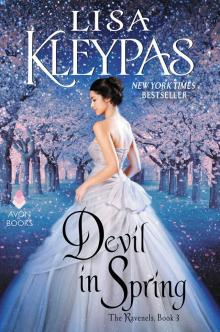 Devil in Spring
Devil in Spring Sugar Daddy
Sugar Daddy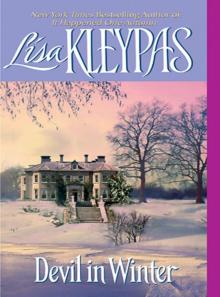 Devil in Winter
Devil in Winter Dreaming of You
Dreaming of You Christmas Eve at Friday Harbor
Christmas Eve at Friday Harbor Love, Come to Me
Love, Come to Me Only With Your Love
Only With Your Love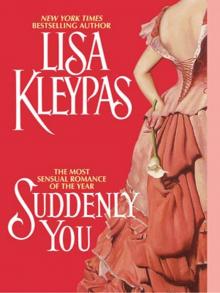 Suddenly You
Suddenly You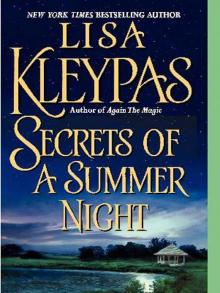 Secrets of a Summer Night
Secrets of a Summer Night Cold-Hearted Rake
Cold-Hearted Rake Where's My Hero?
Where's My Hero? Gifts of Love
Gifts of Love Married by Morning
Married by Morning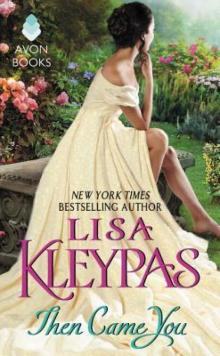 Then Came You
Then Came You Wish List
Wish List Where Dreams Begin
Where Dreams Begin A Historical Christmas Present
A Historical Christmas Present Somewhere I'll Find You
Somewhere I'll Find You Scandal in Spring
Scandal in Spring Someone to Watch Over Me
Someone to Watch Over Me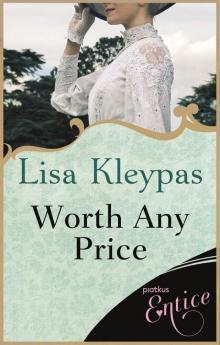 Worth Any Price
Worth Any Price Prince of Dreams
Prince of Dreams It Happened One Autumn
It Happened One Autumn Love in the Afternoon
Love in the Afternoon Devil's Daughter
Devil's Daughter A Wallflower Christmas
A Wallflower Christmas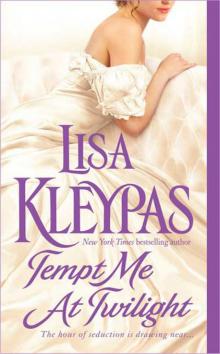 Tempt Me at Twilight
Tempt Me at Twilight Brown-Eyed Girl
Brown-Eyed Girl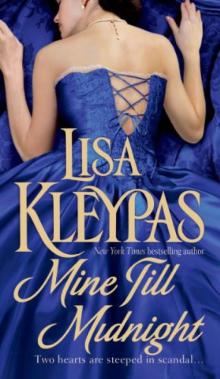 Mine Till Midnight
Mine Till Midnight Again the Magic
Again the Magic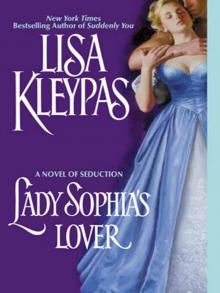 Lady Sophia's Lover
Lady Sophia's Lover Because You're Mine
Because You're Mine Midnight Angel
Midnight Angel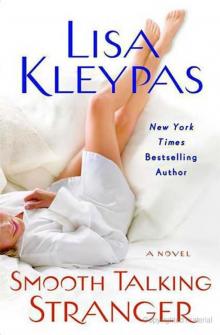 Smooth-Talking Stranger
Smooth-Talking Stranger Blue-Eyed Devil
Blue-Eyed Devil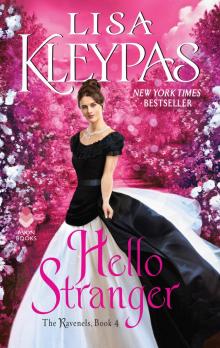 Hello Stranger
Hello Stranger Dream Lake
Dream Lake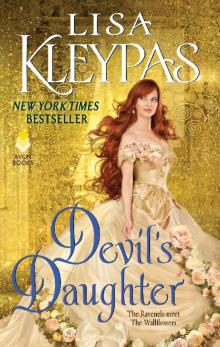 Devil's Daughter: The Ravenels Meet the Wallflowers
Devil's Daughter: The Ravenels Meet the Wallflowers A Christmas to Remember
A Christmas to Remember Smooth Talking Stranger
Smooth Talking Stranger Crystal Cove
Crystal Cove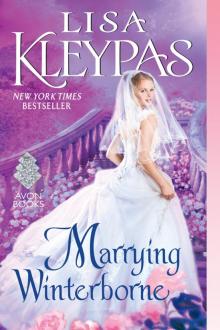 Marrying Winterborne
Marrying Winterborne Stranger in My Arms
Stranger in My Arms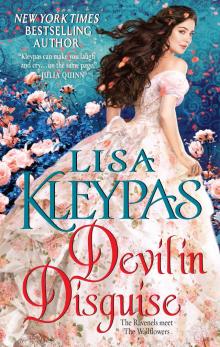 Devil in Disguise
Devil in Disguise Worth Any Price bsr-3
Worth Any Price bsr-3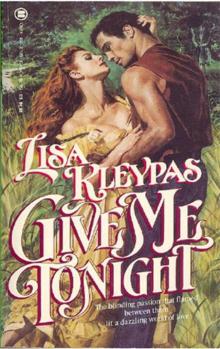 Give Me Tonight
Give Me Tonight Rainshadow Road fh-2
Rainshadow Road fh-2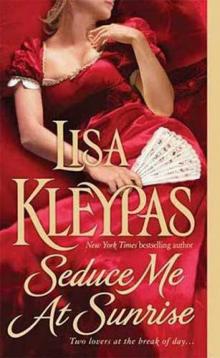 Seduce Me At Sunrise
Seduce Me At Sunrise I Will
I Will Someone to Watch Over Me bsr-1
Someone to Watch Over Me bsr-1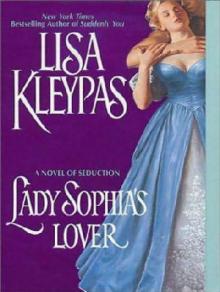 Lady Sophias Lover bsr-2
Lady Sophias Lover bsr-2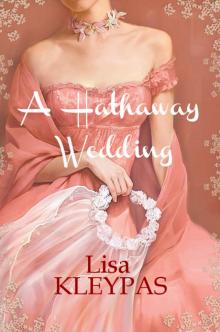 A Hathaway Wedding
A Hathaway Wedding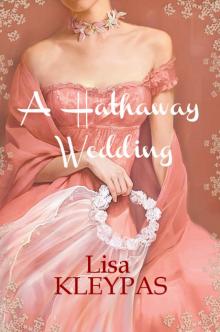 A Hathaway Wedding (Hathaways Bk2.5)
A Hathaway Wedding (Hathaways Bk2.5) Worth Any Price - Bow Street 3
Worth Any Price - Bow Street 3 Christmas with Holly
Christmas with Holly